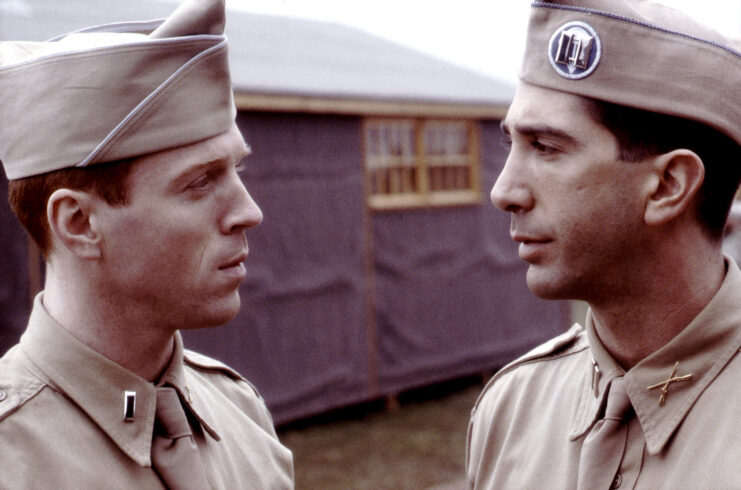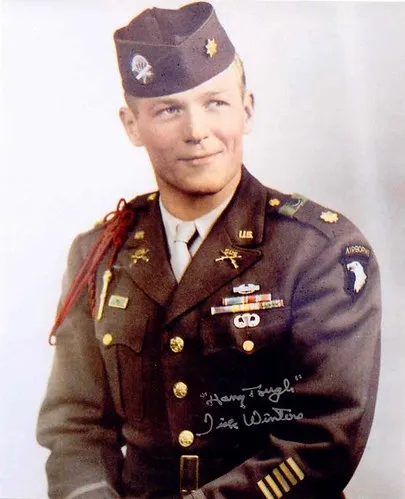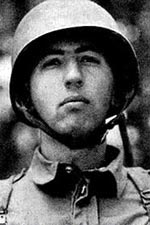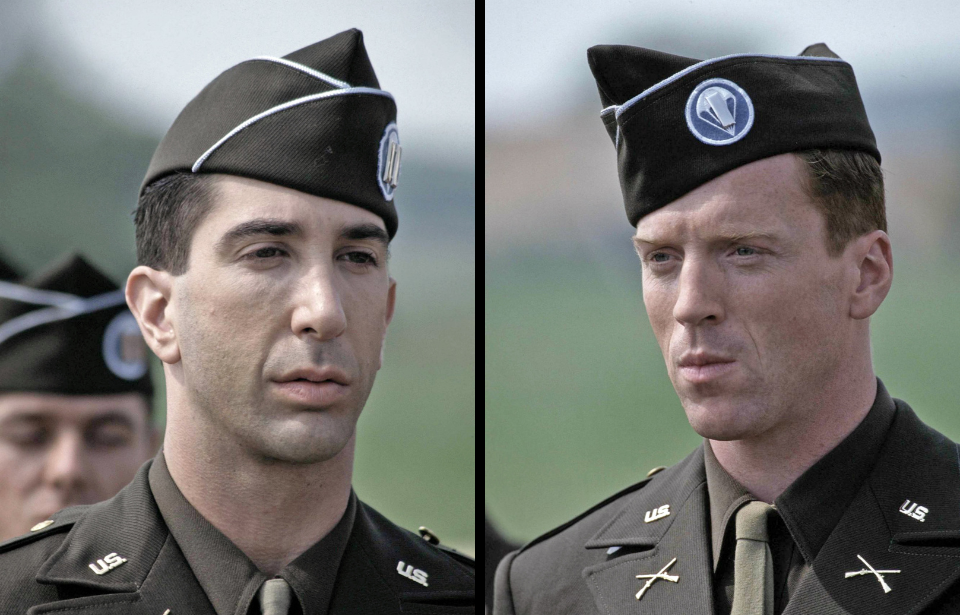The HBO miniseries Band of Brothers (2001) skillfully weaves together fact and fiction, occasionally blurring the lines between what truly transpired and what was artistically enhanced. While the narrative predominantly adheres to the historical actions of Easy Company, 2nd Battalion, 506th Parachute Infantry Regiment, 101st Airborne Division during the Second World War, there is a specific scene that has piqued our curiosity: the court-martial of Richard Winters in the first episode.
The question that’s lingered is whether the real Maj. Winters called for a court-martial. As it turns out, he genuinely did.
Court-martial scene in Band of Brothers

In the premiere episode of Band of Brothers, Capt. Herbert Sobel (David Schwimmer) takes disciplinary action against then-1st Lt. Richard Winters (Damian Lewis) for failing to show up on time to inspect the soldiers cleaning the latrines. However, Sobel had switched the time of inspection at the last moment, which Winters was unaware of.
Despite claiming that he’d tried to call him and even had a runner sent to deliver the message, Winters never caught wind of the time change. It’s important to note the home where Winters was staying at the time didn’t have a phone and that a runner never arrived.
Sobel proceeds to punish Winters for the minor infraction, giving him a choice and saying, “So, your options are quite simple, lieutenant. Punishment for your offenses will be denial of a 48-hour pass for 60 days. Or, you may initiate a letter of appeal and request a trial by court-martial.”
Sobel even tries to offer Winters some kind of understanding, telling him to take the punishment, as “you spend your weekends on base anyway.” Instead, the first lieutenant replies, “I request trial by court-martial,” before saluting his captain and leaving him in a stunned silence.
Is there any truth behind the scene?

Within the miniseries, Herbert Sobel assumes the role of an early antagonist, staunch in his determination to hinder Richard Winters. The character is portrayed as someone who prioritizes the perception of his men as a reflection of himself, rather than focusing on their leadership and well-being. Band of Brothers depicts Sobel as exceedingly strict and malevolent during their training.
Remarkably, it appears the series accurately captured the essence of Sobel’s character and the court-martial scene. In a book by Erik Dorr about Winters, the existence of Sobel’s reprimand and Winters’ signature for requesting a court-martial trial confirms that this petty interaction did indeed occur in real life.
The source material for Band of Brothers, which includes the recollections of surviving members of Easy Company, supports the portrayal of Sobel as petty and harsh. Most of the actual members held unfavorable opinions of him, which is why the subsequent events, though surprising, are not entirely implausible.
Easy Company turned against Herbert Sobel

After Richard Winters’ court-martial, the men of Easy Company began to turn on Herbert Sobel. Soon after, their faith in him disappeared completely. Without Winters, who was performing administrative duties outside of the company during his court-martial, the paratroopers took matters into their own hands.
“A band of sergeants mutinied against Sobel, writing a letter to Col. Sink indicating their unwillingness [to] serve under the captain,” Erik Dorr wrote. “Risking their own futures, the men unleashed a verbal volley undermining Sobel’s authority and abilities. Several of the sergeants were accordingly punished for insubordination.
“Realizing how sour the situation was, Sink at last transferred the captain from Easy Company that February.”
Dorr quoted one of the paratroopers, Tech. Sgt. Donald Malarkey, as having said, “Winters quietly orchestrated the deal to force Sobel out. Not for his selfish gain, mind you; that wasn’t Winters’s style. He was among the most selfless men I’ve ever had the privilege of serving with. No, he did it for the good of the men. He did it to save their lives.”
More from us: Tom Hanks Fired An Actor from ‘Band of Brothers’ Because He Had ‘Dead Eyes’
However, despite their dislike for Sobel, many of the members of the Easy Company credited their survival during World War II to his harsh training – whether that was his intention or not. Winters himself even said, “One of the reasons that Easy Company excelled was undoubtedly Captain Sobel.”
